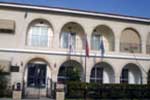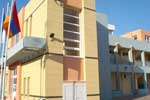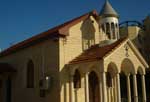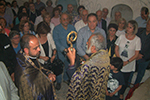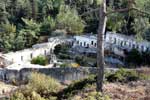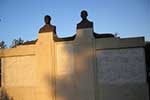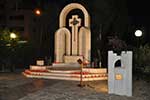Η Στήλη του Σασσουνιαν

NO ONE SHOULD BE FOOLED BY ERDOGAN'S EMPTY APOLOGY FOR KURDISH MASSACRES
Turkish society was thrown into turmoil last week when Prime Minister Erdogan issued an unexpected apology for the hitherto taboo topic of the Kurdish massacres in southeastern Turkey in the 1930's.
There are many striking similarities between the Kurdish massacres and the Armenian Genocide. Under the guise of quelling a rebellion, the Turkish government, led by Kemal Ataturk, ordered the killing and deportation of tens of thousands of Alevi Kurds from Dersim, now known as Tunceli. Turkish warplanes dropped bombs and sprayed poisonous gases on Kurds hiding in mountain caves.
Ironically, taking part in the bombing raids was Sabiha Gokcen, Turkey's first female pilot, who was an Armenian orphan adopted by Ataturk. Gokcen was unwittingly participating in the killing of not only Kurds, but also fellow Armenians who had sought refuge in the remote region of Dersim, after having survived the 1915 Genocide.
Erdogan's surprise admission of the "Dersim killings" was prompted not by an honest desire to lift the veil of secrecy from a long concealed state crime, but by the intent to discredit his main political opponent, Kemal Kilicdaroglu, leader of the Republican People's Party (CHP) which was in power during the Kurdish atrocities.
Erdogan shrewdly scored a major public relations coup when Kilicdaroglu, a native of Dersim who had lost many members of his family, refused to reverse the CHP's long-standing cover up of these massacres.
Seeing an opportunity to deliver a bigger blow to his reticent rival, Prime Minister Erdogan went on national TV, revealing a series of documents from the state archives that provided chilling details of the brutal torture of Kurdish men, rape of women and mutilation of children. In a dramatic gesture, he tore up the government's falsified report on the Dersim carnage.
To counter Erdogan's attacks, Kilicdaroglu came up with a surprise announcement of his own. Despite his failure to acknowledge the Dersim massacres, Kilicdaroglu claimed that an apology was not enough! He challenged Erdogan to release all archival documents on this subject, and return the properties confiscated from the Kurdish victims.
The Prime Minister's surprise apology generated a major national debate in Turkey. Some media commentators viewed Erdogan's acknowledgment of the Dersim massacres not only as an effort to undermine Kilicdaroglu's support with millions of Alevi voters, but also to tarnish Ataturk's legacy. Others saw hopeful signs that Erdogan was preparing to face other dark chapters of Turkey's history, including the Armenian Genocide.
Kilicdaroglu, in turn, tried to damage Erdogan's reputation by accusing him of planning to acknowledge the Armenian Genocide, and likened his mentality to that of Diaspora Armenians. Erdogan promptly distanced himself from what he considered to be an insulting comparison, and sharply rebuked and warned his political opponent for drawing such a parallel!
Erdogan's racist reaction did not bode well for those who claimed that "the genie is out of the bottle," hoping that the Prime Minister's apology to the Kurds would set a precedent for Turkey's eventual acknowledgment of the Armenian Genocide. When one carefully examines the Prime Minister's distorted statements on the Dersim massacres, one cannot help but note the eerie similarities with Turkey's denialist views on the Armenian Genocide:
- Minimizing the Kurdish death toll from tens of thousands to 13,800;
- Describing the Kurdish massacres merely as "killings" or "events";
- Placing the blame for the "killings" on a rival political party rather than the Turkish state; and
- Offering no compensation and no restitution to heirs of the Kurdish victims.
All those hoping that Erdogan would issue a similar apology for the Armenian Genocide probably do not realize the futility of their expectation. In reality, a Turkish apology would do more harm than good to the Armenian Cause, as it would discourage some Armenians from pursuing restitution from Turkey, mislead the international community into thinking that Armenian demands are now completely fulfilled, and deprive Armenians from attracting further political support for their national cause.
Furthermore, should Erdogan apologize for the Armenian Genocide, the international community would shower him with praise, nominate him for the Nobel Peace Prize, and support Turkey's candidacy to the European Union.
The international community should rather demand that Erdogan fully acknowledge the genocides of Armenians, Assyrians, Greeks, and Kurds, issue a genuine apology, offer compensation, and return the confiscated properties to the heirs of millions of innocent victims.
By Harut Sassounian
Publisher, The California Courier






